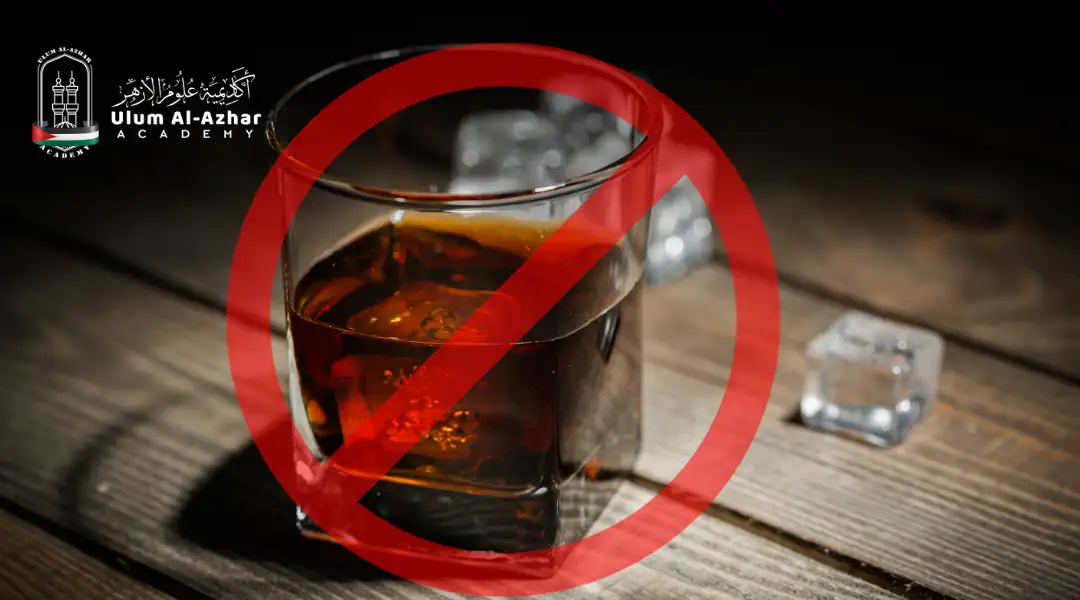
Punishment for Drinking Alcohol in Islam: Laws and Consequences
Does Islam prohibit something merely to make life difficult, or is there wisdom behind every prohibition? Whether we know the wisdom in our life or not, the prohibition is certainly for the benefit of human beings. The greatest proof of this is the prohibition of drinking alcohol.
Islamic teachings offer a complete guide for how Muslims should live their lives. One of the clear rules set by Allah through His Prophet ﷺ is that drinking alcohol is not allowed. Alcohol is seen as bad for a person’s health and also causes harm to families and society as a whole. This article discusses what happens if someone drinks alcohol in Islam, the punishment for drinking alcohol in Islam along with the spiritual, health, and social effects of alcohol use.

Early Stages of Prohibition During Revelation
The prohibition of alcohol did not come all at once. Out of His wisdom, Allah delayed its prohibition, because if it had been forbidden from the very beginning, many people might have refrained from entering Islam because of it. Out of His mercy, He postponed the prohibition until people had embraced Islam in large numbers, had become firmly established in faith, and had grown comfortable with the teachings of Islam. So Allah prohibited it in stages, showing divine wisdom:
The first stage: Allah did not forbid it in Makkah. The same was the case in the early period of Madinah; He permitted them to consume it. Alcohol at that time had a significant status among the Arabs as they composed poetry about it.
Then, the prohibition developed step by step until people abandoned it with conviction and insight.
The second stage, Initial discouragement: In Surah Al-Baqarah, Allah mentioned that there is sin in wine, though some benefit, but its sin is greater than its benefit as the verse say:
“They ask you about wine and gambling. Say: In them is great sin and [yet, some] benefit for people. But their sin is greater than their benefit” (Al-Baqarah-219).
At that point, a sense of its prohibition settled in the hearts, as they realized that its harm outweighed its benefit, and that anything of such a nature ought to be avoided. Yet, despite this, people did not give it up immediately, due to their strong attachment and habit. That is why ʿUmar ibn al-Khattab used to supplicate: “O Allah, give us a clear ruling about alcohol.”
This verse, however, laid the foundation for the final prohibition and created readiness in their hearts to accept a decisive ruling. Scholars mention that among the worldly benefits of alcohol at that time were the profits gained from trading in it and the wealth obtained through selling it, as well as the money won through gambling. But all of this came with great evil. A person might become a wealthy merchant one day, and on another day end up a destitute pauper.
Third stage, restriction during prayer times: Allah forbade them from consuming it at the time of prayer, as He said: “O you who have believed, do not approach prayer while you are intoxicated until you know what you are saying” (An-Nisa-43).
Fourth stage final prohibition: After that, Allah revealed the final and decisive prohibition once minds and hearts were prepared to accept His ruling, once people had come to know the religion of Allah, and once their hearts had truly tasted the sweetness of faith. At that point, they immediately abandoned it, turned away from it, and destroyed whatever they had of it when Allah revealed His words:
“O you who have believed, indeed, intoxicants, gambling, [sacrificing on] stone alters [to other than Allah], and divining arrows are but defilement from the work of Satan, so avoid it that you may be successful” (Al-Ma’idah -90).
The Muslims immediately refrained from it. Umar Ibn Alkhatab رضي الله عنه said: “We have stopped, we have stopped.” The companions followed him, abandoning it completely, and they ordered that whatever remained of it be spilled and destroyed.
This gradual method demonstrates the mercy of Allah and the practical wisdom of Islamic legislation. Yet, once prohibited, the punishment for drinking alcohol in Islam became necessary to enforce the law and protect the community.
Offering a free consultation with Al-Azhar-certified Sheikhs from Egypt to help you begin personalized Islamic learning.

The Prohibition of Alcohol in Qur’an and Hadith
As shown previously, the Qur’an gradually prohibited alcohol, moving step by step until a complete ban was established. Allah says in Surah Al-Ma’idah (5:90):
“O you who have believed, indeed, intoxicants, gambling, [sacrificing on] stone alters [to other than Allah], and divining arrows are but defilement from the work of Satan, so avoid it that you may be successful.”
This verse clearly establishes alcohol as forbidden (haram). The Prophet Muhammad ﷺ further reinforced this prohibition in authentic Hadith. He said:
Ibn ‘Umar reported God’s Messenger as saying, “Every intoxicant is khamr and every intoxicant is forbidden. He who drinks wine in this world and dies when he is addicted to it, not having repented, will not drink it in the next (he means Alakhira) ” Muslim transmitted it.
Thus, from both the Qur’an and Sunnah, the prohibition is categorical. Consuming alcohol is a major sin, and the punishment for drinking alcohol in Islam reflects the seriousness of this act.
Punishment for Drinking Alcohol in Islam
The punishment for drinking alcohol in Islam has been addressed in the Sunnah. As In Musnad Ahmad, it is reported from Ibn Abbas that the Prophet ﷺ said:
“Jibreel came to me and said: O Muhammad, indeed Allah has cursed alcohol, the one who produces it, the one who has it produced, the one who drinks it, the one to whom it is carried, the one who sells it, the one who buys it, the one who serves it, and the one who consumes what is served.” Cursing (la‘n) means being expelled from the mercy of Allah.
Accordingly, the scholars of Islam have unanimously agreed that drinking alcohol is a major sin, one of the gravest offenses, and that it must be avoided completely, as made clear in the verse from Surah Al-Ma’idah. Also, the Prophet ﷺ said:
“Every intoxicant is forbidden, and indeed Allah has taken a covenant that whoever drinks an intoxicant will be made to drink from the mud of al-khabaal.” They asked: “O Messenger of Allah, what is the mud of al-khabaal?” He replied: “The sweat of the people of Hell, or the discharge of the people of Hell.” (Narrated by Muslim).
In addition, for the drinker of alcohol, his prayer will not be accepted for forty days, as the Prophet ﷺ said:
“Whoever drinks alcohol, Allah will not accept his prayer for forty days. If he repents, Allah will forgive him. If he returns to it, Allah will not accept his prayer for forty days. If he repents, Allah will forgive him. If he returns again, Allah will not accept his prayer for forty days. If he repents, Allah will forgive him. But if he returns a fourth time, Allah will not accept his prayer for forty days, and if he repents, Allah will not accept his repentance, and he will be made to drink from the river of al-khabaal.” That is: the pus of the people of Hell.
Therefore, the punishment for drinking alcohol in Islam meant to protect society and uphold moral discipline. It is not merely punitive but also corrective, aiming to remind the Muslim of the gravity of disobeying Allah.

Spiritual and Health Consequences of Alcohol
Beyond the punishment for drinking alcohol in Islam, Islam stresses the spiritual and physical harms of alcohol.
Spiritual harm: Drinking alcohol clouds the mind, distances a believer from Allah, and weakens one’s ability to perform worship with sincerity and concentration. The Prophet ﷺ warned that the one who drinks repeatedly without repentance risks losing Allah’s mercy.
Health harm: Modern science confirms what Islam warned centuries ago. Alcohol damages the liver, weakens the immune system, increases the risk of cancer, and causes addiction.
Social harm: Alcohol leads to family breakdown, violence, and crime. And it also causes poverty. Islam’s ban prevents these harms before they take root.
Community Awareness and Education Efforts
Islam is not only about punishing wrongdoers but also about creating an environment where sins are avoided. Thus, community awareness and education play a major role in preventing alcohol consumption.
Mosques and religious institutions provide guidance and preach about the dangers of alcohol.
Educational programs emphasize the Qur’anic wisdom behind prohibition and the Prophet’s ﷺ clear warnings.
Family and community support helps rehabilitate those struggling with addiction, encouraging repentance and spiritual healing.
By raising awareness, Muslims can save themselves from the punishment for drinking alcohol in Islam, not only for the sake of avoiding punishment, but first and foremost to seek the pleasure of Allah by saying: “We hear and we obey” to His commands.
Ulum Al-Azhar Academy recognizes its responsibility in raising awareness and educating about the teachings of Islam; therefore, it helps Muslims understand these teachings in a simple and easy manner through learning Shariah (Islamic Jurisprudence) for beginners | Ar-Riwaq Al-Azhari.

Conclusion
From the Qur’an and Sunnah, the ruling is clear: alcohol is haram, and consuming it is a major sin. The punishment for drinking alcohol in Islam is designed to safeguard individuals and society. However, Islam also emphasizes mercy, repentance, and community education. By combining deterrent laws with spiritual awareness, Islam protects both the soul and the body from the destructive effects of alcohol.
Connect with Al-Azhar-certified Sheikhs from Egypt for a free consultation to start your personalized Islamic studies.
FAQs
What is the punishment for drinking alcohol in Islam?
As the previous evidence has shown, the punishment for a drinker of alcohol—if he does not repent—is the Fire, the non-acceptance of his prayers for forty days, and he may be expelled from the mercy of Allah.
Why is alcohol prohibited in Islam?
Alcohol is prohibited because it harms the mind, body, and soul, and leads to social corruption. The punishment for drinking alcohol in Islam reflects its seriousness.
Can someone repent after drinking alcohol?
Yes. Islam always leaves the door of repentance open. If someone sincerely repents and avoids alcohol, Allah forgives them.
Why did Islam ban alcohol consumption?
Simply, Islam prohibited alcohol because it harms both the mind and body as it:
- leading to the loss of reason
- poor judgment
- and destructive behavior.
- social, and economic consequences
Tag:alcohol in quran and hadith, can you go to heaven if you drink alcohol islam, can you pray after drinking alcohol in islam, hadith about alcohol 40 days, how many times is alcohol mentioned in the quran, how to repent for drinking alcohol in islam, if a muslim drinks alcohol can he pray, punishment for drinking alcohol in Islam, verse in quran about alcohol, why is alcohol forbidden in islam
